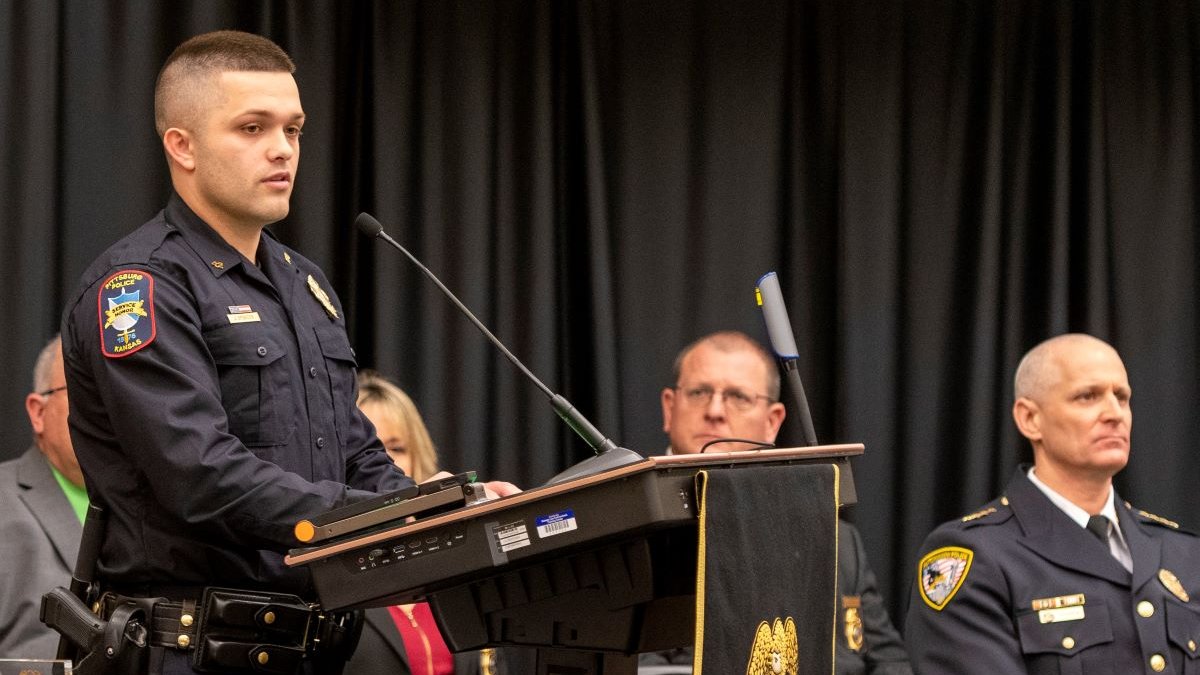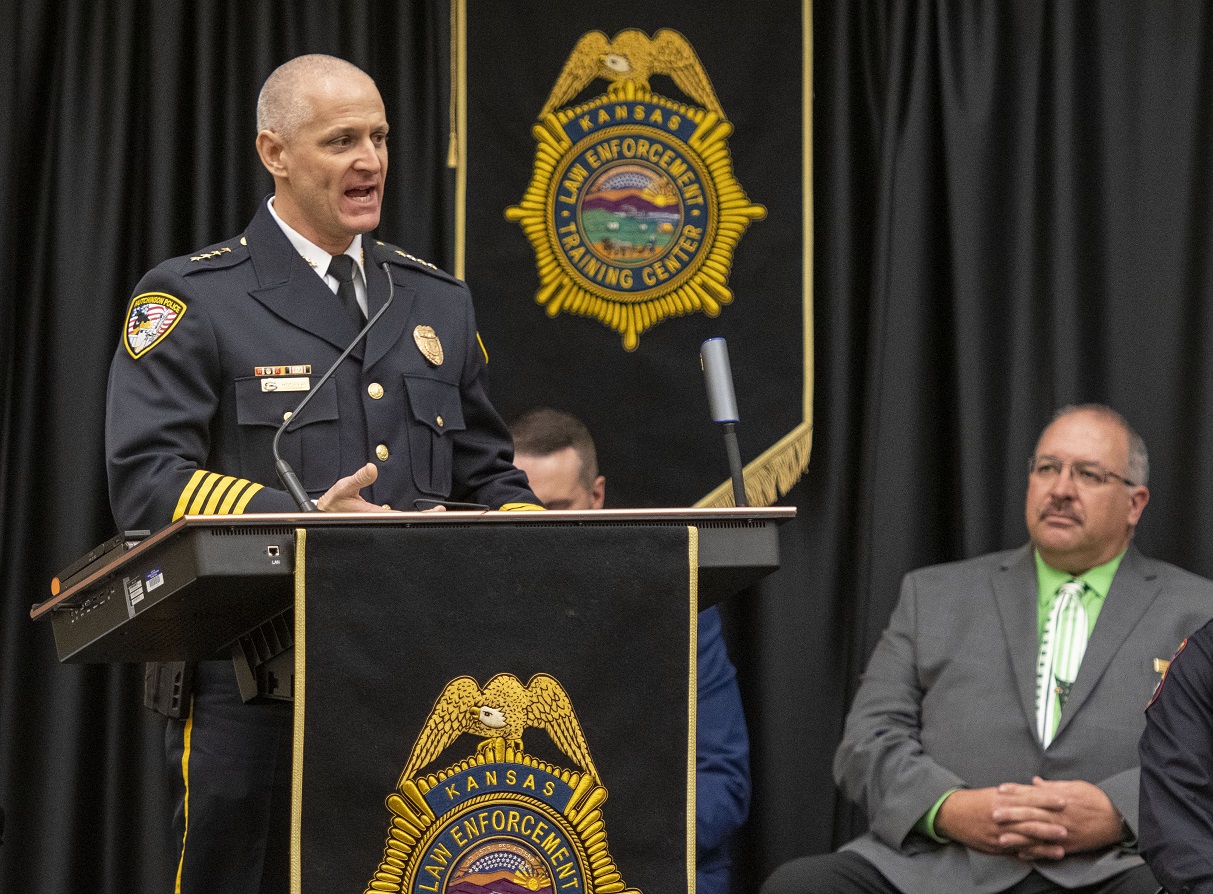KLETC Announces 259th Law Enforcement Training Graduating Class

YODER (Dec. 4, 2019) – Twenty-two new law enforcement officers graduated from the Kansas Law Enforcement Training Center (KLETC) on Nov. 22, 2019. Chief Jeffrey Hooper, of the Hutchinson Police Department, was the speaker for the ceremony in KLETC’s Integrity Auditorium.
The new officers were members of the 259th basic training class at the center. Located one mile west and one mile south of Yoder, near Hutchinson, the center is a division of University of Kansas Professional & Continuing Education.
The graduates, who began their training August 19, 2019, represented 21 municipal, county and state law enforcement agencies from across Kansas.

Graduates receive certificates of course completion from KLETC and Kansas law enforcement certification from the Kansas Commission on Peace Officers’ Standards and Training, the state’s law enforcement licensing authority. The training course fulfills the state requirement for law enforcement training. Classroom lectures and hands-on applications help train officers to solve the increasingly complex problems they face in the line of duty.
Established by the Kansas Legislature in 1968, the center trains the majority of municipal, county and state law enforcement officers in Kansas and oversees the training of the remaining officers at seven authorized and certified academy programs operated by local law enforcement agencies and the Kansas Highway Patrol.
About 300 officers enroll annually in KLETC 14-week basic training programs. The center offers continuing education and specialized training to over 10,000 Kansas officers each year.
Graduates who granted permission to release their names are listed below by agency.
Bourbon County
Fort Scott Police Department; Logan Woods; Patrol Officer; Fort Scott
Cherokee County
Columbus Police Department; Preston Hosier; patrol officer; Columbus
Crawford County
Pittsburg Police Department; Jesse Spencer; patrol officer; Pittsburg
Finney County
Finney County Sheriff’s Office; Kevin Chalmers; deputy; Garden City
Gray County
Gray County Sheriff’s Office; Michael Bradley; deputy; Cimarron
Harper County
Harper County Sheriff’s Department; Christopher Sanders; deputy; Anthony
Miami County
Miami County Sheriff’s Department; Austin Jones; deputy; Paola
Miami County Sheriff’s Department; Toni Towler; deputy; Paola
Morton County
Morton County Sheriff’s Department; Craig Harrington; deputy; Elkhart
Neosho County
Neosho County Sheriff’s Department; Kevin Carr; deputy; Erie
Reno County
Hutchinson Police Department; Jesse Jones; patrol officer; Hutchinson
Hutchinson Police Department; David Mancillas; patrol officer; Hutchinson
Hutchinson Police Department; Hunter Ogburn; patrol officer; Hutchinson
Saline County
Salina Police Department; Blake Denton; patrol officer; Salina
About the University of Kansas Professional & Continuing Education
KU Professional & Continuing Education supports the teaching, research and public service missions of the University, contributing to postgraduate professional education, workforce development, distance learning and quality of life for Kansans and worldwide communities. Other programming within Professional & Continuing Education includes Professional Programs, Aerospace Short Courses, Osher Lifelong Learning Institute, Kansas Law Enforcement Training Center and Kansas Fire & Rescue Training Institute. Combined, these programs teach more than 30,000 individuals a year in every county in Kansas, across the United States and internationally. It is headquartered at the KU Edwards Campus in Overland Park, Kansas.
About the Kansas Law Enforcement Training Center
Established by the Kansas Legislature in 1968 as the central law enforcement training facility for our state, the Kansas Law Enforcement Training Center (KLETC) serves as the headquarters for all law enforcement training in Kansas. Located at the former naval air station south of Hutchinson and west of Yoder in Reno County, Kansas, the Center’s mission, as expressed in the Law Enforcement Training Act, K.S.A. 74-5601 et. seq. is “the promotion and development of improved law enforcement personnel and procedures throughout the state, and the training center shall offer to qualified applicants such programs and courses of instruction designed to fulfill this end.” KLETC directly trains the overwhelming majority of municipal, county and state law enforcement officers in Kansas, and oversees, supervises and monitors the training of the remaining officers at eight authorized and certified academy programs operated by local law enforcement agencies and the Kansas Highway Patrol.





